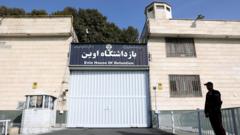Tensions escalate as the U.S. and Qatar work towards a cease-fire deal between Israel and Iran after recent missile exchanges, with no official confirmation from the parties involved.
Qatar Plays Key Role in Mediating Potential Israel-Iran Cease-Fire

Qatar Plays Key Role in Mediating Potential Israel-Iran Cease-Fire
Diplomatic sources reveal Qatar's influence in persuading Iran to consider a cease-fire following recent escalations.
June 23, 2025, 8:47 p.m. ET—In a significant diplomatic intervention, Qatar has reportedly facilitated an agreement between the Trump administration and Iran, leading to a potential cease-fire with Israel. Although no official statements have been made by either the Israeli or Iranian governments, three diplomats with insider knowledge have disclosed that Iran is prepared to accept a U.S. cease-fire proposal.
The cease-fire discussions come after a week of extensive missile strikes between Israel and Iran, with President Trump suggesting through social media that an agreement was imminent. Iranian officials, preferring to remain unnamed, have indicated their nation's willingness to consider the cease-fire, while an Israeli military spokesperson chose not to comment, as Israeli military operations against Iran continued through early Tuesday.
The process of negotiating this cease-fire was initiated during a conversation between President Trump and Sheikh Tamim bin Hamad Al Thani, the emir of Qatar. Following this discussion, the Qatari prime minister, Sheikh Mohammed bin Abdulrahman Al Thani, engaged with Iranian leadership and successfully encouraged their agreement to the cease-fire proposal.
Despite the potential accord, President Trump clarified on social media that the cease-fire would not commence until both nations had "wound down" ongoing military operations, a process he outlined would occur in phases throughout the day.
In a notable escalation, Iran had launched missiles targeting Al Udeid Air Base—an essential U.S. military installation situated in Qatar—prior to the cease-fire dialogue. Should an official agreement be reached, Qatar's dual position in the talks would reflect its condemnation of Iran's aggressive actions while simultaneously acting as a mediator for peace.
Qatar has positioned itself as an essential diplomatic player in the region, having previously facilitated indirect cease-fire discussions between Israel and Hamas. Their expertise in negotiating between conflicting parties underscores Qatar's intent to remain a pivotal figure in the Middle East's complex landscape.
The cease-fire discussions come after a week of extensive missile strikes between Israel and Iran, with President Trump suggesting through social media that an agreement was imminent. Iranian officials, preferring to remain unnamed, have indicated their nation's willingness to consider the cease-fire, while an Israeli military spokesperson chose not to comment, as Israeli military operations against Iran continued through early Tuesday.
The process of negotiating this cease-fire was initiated during a conversation between President Trump and Sheikh Tamim bin Hamad Al Thani, the emir of Qatar. Following this discussion, the Qatari prime minister, Sheikh Mohammed bin Abdulrahman Al Thani, engaged with Iranian leadership and successfully encouraged their agreement to the cease-fire proposal.
Despite the potential accord, President Trump clarified on social media that the cease-fire would not commence until both nations had "wound down" ongoing military operations, a process he outlined would occur in phases throughout the day.
In a notable escalation, Iran had launched missiles targeting Al Udeid Air Base—an essential U.S. military installation situated in Qatar—prior to the cease-fire dialogue. Should an official agreement be reached, Qatar's dual position in the talks would reflect its condemnation of Iran's aggressive actions while simultaneously acting as a mediator for peace.
Qatar has positioned itself as an essential diplomatic player in the region, having previously facilitated indirect cease-fire discussions between Israel and Hamas. Their expertise in negotiating between conflicting parties underscores Qatar's intent to remain a pivotal figure in the Middle East's complex landscape.





















